7 Tips for Smart Boat Buying
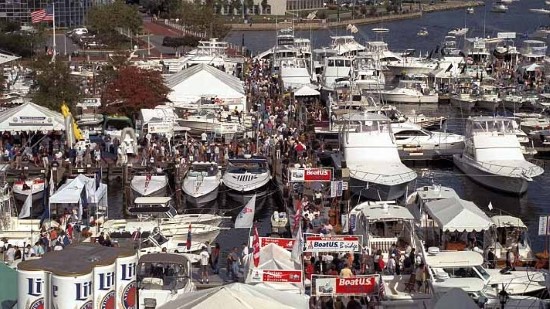
The boat you buy, whether new or used, could be the second most expensive item you purchase after your home. And, just as there are a lot of things to consider when buying a house that are not self-evident, the same holds true for boats. Here are some simple, basic guidelines to keep you on the right course.
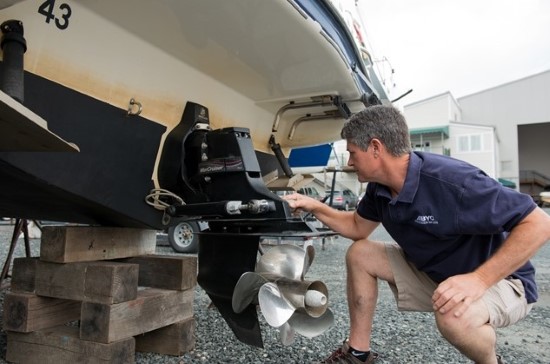
1. How Old Is She?
Some new boats sit unsold at dealerships for years. A brand-new boat selling at a "fantastic" discount compared to current MSRP might be last year's model, or even the year before – they are called “non-current” models. The boat's still new, but as soon as she leaves the showroom, she'll depreciate to model-year value.
So maybe the deal isn't as great as it looks. The sales contract will list the model year, but it's better to know beforehand. For that, refer to the H.I.N.
What's a H.I.N.?
Since the early 1970s, federal law has required boat manufacturers to tag their boats with permanent Hull Identification Numbers (H.I.N.). The 12-digit alphanumeric H.I.N. indicates the manufacturer, using a three-letter code (decipher it at http://uscgboating.org/content/manufacturers-identification.php), the serial number, the month and year of manufacture (specifically, the month and year when manufacture began) and the model year. The H.I.N. is like a birth certificate for the boat.
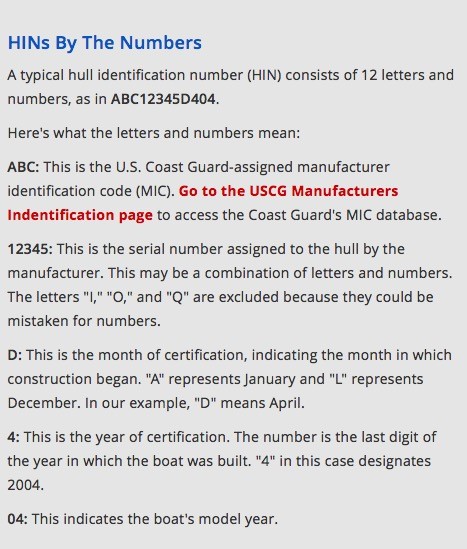
The H.I.N. format has changed over the years, so if the boat you're considering was built before August, 1984, her H.I.N. is arranged slightly differently from boats built after that date. An Internet search will help with this, but a rule of thumb is, the last numerals show the model year. This isn't always dead accurate, but it's close.
Use the H.I.N. to help prevent overpaying for a used boat. Like used cars, used boats are priced based on model year. (Production boats are, anyway; prices of pre-owned custom boats are less predictable.) Check the H.I.N. to find out the model year, then consult with B.U.C. (http://www.bucvalu.com/) or NADA (http://nadaguides.com/Boats) for their opinion on the price you should be paying. B.U.C. requires sign-up, but it's free for the basic level, which is enough.
Another way to check market value for a used boat is to check the classified ads in BoatTEST, YachtWorld, or BoatTrader.
Used boat buyers should make sure the boat is actually owned by the seller as well as to learn the provenance of the boat. Was it in a hurricane or did it suffer a serious accident? Some people make a living buying distressed boats, rehabbing them and then selling them for a great “deal.” Our experience is that people looking for a great deal, usually get a great deal less. We recommend using BoatHistoryReport.com to identify possible bad actors.
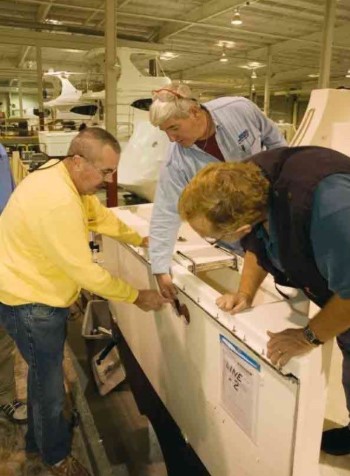
2. Is She Built to Established Standards?
In 2007, the National Marine Manufacturers Association started a voluntary program to certify boats built by participating members, to ensure they were built to a known standard of quality. About 90% of the American Boat and Yacht Council (ABYC) standards are used as the basis for NMMA certification. As of 2018, 51 categories of design, systems, equipment, and safety are addressed.
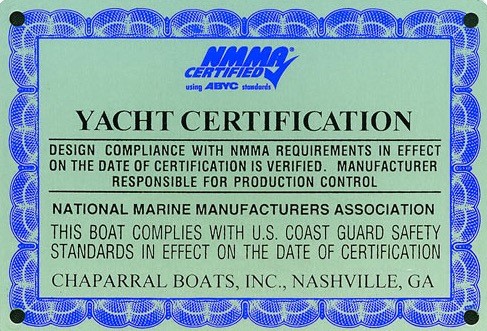
NMMA certification is mostly about systems and equipment; it doesn't address construction, and no sea trial is required. A boat can be flimsy and a dog at sea, but still carry an NMMA certificate. Unlike American Bureau of Shipping, Lloyds or Det Norske Veritas (many commercial vessels and larger yachts are built under these rules), NMMA does not require every certified boat to be inspected individually. Instead, the NMMA certifies a model line, and relies on the builder to maintain the standards in every boat built in that line.
Today, the NMMA estimates that 85% of new boats sold in the U.S. are certified, and carry a certification plate attesting to this. That means 15% of the new boats sold are not NMMA certified. That does not necessarily mean anything is wrong with them, but it does mean that these builders are not dues-paying members of the NMMA.
Boats built prior to 2007? That's where an experienced surveyor comes in, and a mechanic to check the engines, too – something that is a good idea even for newer boats.
CE Ratings. The European Union has its own set of standards for boats, and unlike the ABYC/NMMA standards, which are voluntary, these are required for all boats sold in the EU. Generally, they are the same as the ABYC standards, but they are more stringent in some areas.
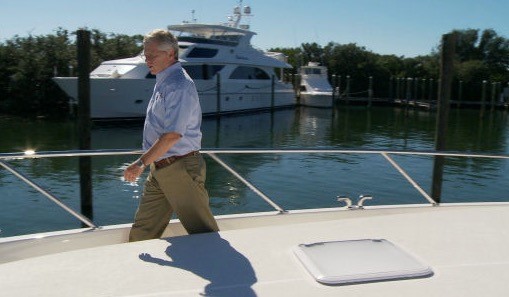
3. Builder Integrity
Ultimately, the consumer’s best guarantee of good quality construction and installation is the integrity, knowledge, and experience of the builder. Good builders go further than NMMA requirements. They want to protect their reputation and they don’t want lawsuits, so they do what it takes to build a good boat. That usually requires spending more money on materials, equipment, labor, and overhead. Good boats are usually not cheap.
How to find builders with integrity? First, see if BoatTEST has tested a boat from this brand in the last 12 months. BoatTEST does not test boats built by companies that we know to be of questionable integrity. Second, talk to friends at the marina or the yacht club. Third, talk to the dealer and other dealers to see what they have to say.
Boating chat rooms are full of people willing to throw bricks or roses at nearly any brand. Beware of trolls – Internet chatters that harshly bash a builder to such a degree that it is obvious that the author has an agenda. On the other hand, be aware that dealers use forums to praise the boats they sell to the stars. Our monitoring of chat rooms indicate just as one might expect from a public forum – comments from the ridiculous to the sublime.
Integrity in Practice. Over the years, we have seen exemplary examples of the boat builder doing the right thing. We have also seen builders and engine companies who have turned a deaf ear to reasonable complaints or pleas for help. It usually depends on the integrity and approach of the person at the top at any given time.
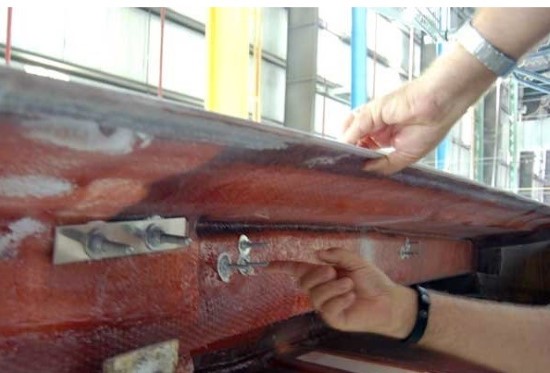
4. Engine Caveat
The engine is the most expensive, and the most critical, single piece of equipment on the boat. Take the engine seriously – not for granted. With only a few exceptions, the engine in the boat being considered was made by another company – it is not like when buying a car and the engines are made by the automobile manufacturer.
All engine makers are not the same. Our experience is that they all go through cycles of management, some better than others. All of this means, read their warranty and maintenance requirements to keep your warranty in place. They all go by the letter of the warranty, not what the consumer may think is the spirit.
Just because it’s new, it doesn’t mean that the engine will reach peak expected performance. First, your expectation of performance might be too high. Boats are very weight sensitive. We test with only two people aboard – if you plan to have four or more people, on boats under 30’ (9.14 m), performance will be less. Check BoatTEST data to see what performance we got from the boat. Use only the numbers in our tables – which are always what we recorded. If we say that performance numbers are from the manufacturer – that is exactly what they are. For some reason we were not able to get numbers (bad prop, bad weather, faulty readout, etc.) and the best we can offer is what the builder says.
Also, be aware that on every engine, compression, max RPM, horsepower, and unit integrity can vary. That’s why the SAE gives engine makers a 10% leeway on “rated” horsepower vs. actual horsepower. That means a 300-hp engine can actually be a 270-hp engine, or a 330-hp engine.
5. How Good is the Warranty?
All new boats come with a warranty, but not all warranties are the same. Most warranties are complex, since the builder typically covers the hull, deck, and, sometimes, other components manufactured or installed by the builder.
Take the words in that warranty literally. Assume nothing. If the warranty says it covers the hull for 10 years, it means just the hull – not the deck and superstructure.
The engine, transmission, and related components are covered by their own warranty. Generally, components such as air conditioning, pumps, refrigeration, and other items have their own warranties, but could also come under the builder's warranty.
A new boat can come with a stack of warranties. The coverage period will vary from none (batteries, propellers, damage caused by corrosion) to the life of the boat (hull), at least for the original owner. Sometimes the warranty can be transferred to a second owner, or multiple owners.
Obviously, this adds value to the boat.
Increasingly, the better boat builders will warranty most of the equipment aboard from one to 5 years. Such a warranty has important value and we would generally lean in favor of such a builder, all other things being equal.
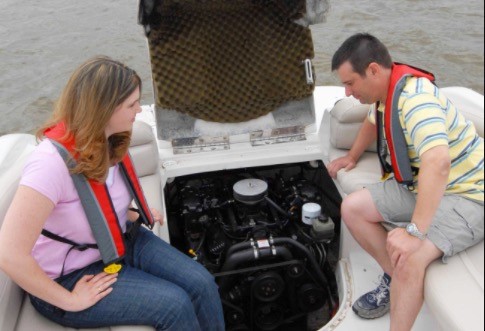
Whether a system is covered by the warranty often depends on who installed the equipment, and if they are qualified to do so. Some dealers install optional items themselves on boats they have in stock, rather than order a boat from the factory. Typically, items installed by the dealer are not covered by the factory warranty – unless the factory expressly says that authorized dealer-installed equipment is covered.
Our experience is that it is often a challenge to get a low-priced boat builder, or a small boat builder, to honor warranties, particularly in gray areas. Generally, they have not reserved enough, or anything, for warranty claims, or have spent the money if they did. And, if a boatbuilder has gone out of business, been bought out of bankruptcy, or sold, usually the old warranties are worthless.
6. Can She Be Insured?
Every boat buyer should choose an insurance company/broker beforehand; learn about the different types of policies and endorsements; and understand the insurer's requirements for writing a policy, including details of the survey, which are rarely required for new boats.
It's almost impossible to get a boat loan unless the boat's insured, and most marinas and boatyards require insurance coverage, too. There's rarely a problem getting insurance for a new boat from a production builder – high-performance boats being an exception with rates being higher and personal qualifications of the owner being more important. Insurance is more of an issue with old boats, custom boats, or wooden boats.
Check Before You Buy. On large boats, say over 50’ (1.27 m) or so, where the owner is also going to be the operator, the insurance company may have restrictions or crew requirements. When buying particularly large boats, say over 70’ (1.78 m), unless the owner can demonstrate lots of experience, the insurance carrier may require a captain, and, on larger boats, a crew as well.
Also, the insurance policy may have geographic stipulations, as well as requirements for protecting your boat in the face of a named storm. It is important to understand all of these details before buying.
Finally, not all insurance companies pay off with alacrity. It is best to get expert advice as to which insurance company to spend your money with.
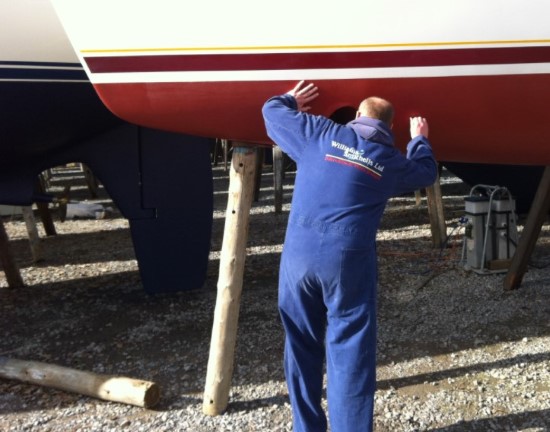
7. Hire a Qualified Surveyor
Never buy a used boat without a survey by a skilled, experienced surveyor, preferably one accredited by either the National Association of Marine Surveyors (NAMS – http://www.namsglobal.org/) or the Society of Accredited Marine Surveyors (SAMS – http://www.marinesurvey.org/). The surveyor should also be a member of the ABYC, and have access to the latest standards.
The surveyor isn't a guarantor of the boat, but provides “an educated opinion” on her condition, problems, and market value, along with a detailed written report that can be submitted to the lender and insurance company. Boats are usually sold "subject to survey," so if the buyer doesn't like what the surveyor finds, he can kill the deal, and get his deposit back. (A sea trial should be included as part of the survey, and the buyer should attend both.)
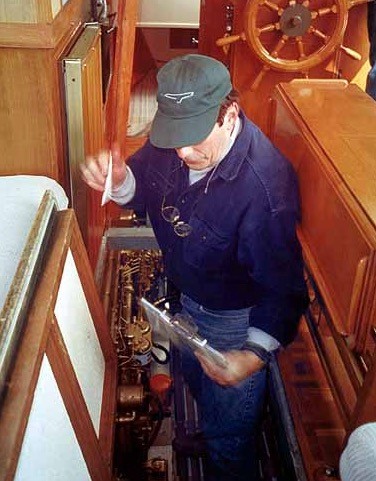
Armed with a survey report showing this or that needs work, some buyers, rather than back out of the purchase, renegotiate the selling price to reflect the estimated cost of repairs. We don't recommend this.
Everything on a boat costs more than expected once installed or fixed, and we don't want to be holding the bag for the excess. Instead, we want the seller to fix things at his expense, then we'll pay the agreed-on price. If the seller won't do this, we'll find another boat. There are plenty of them for sale.
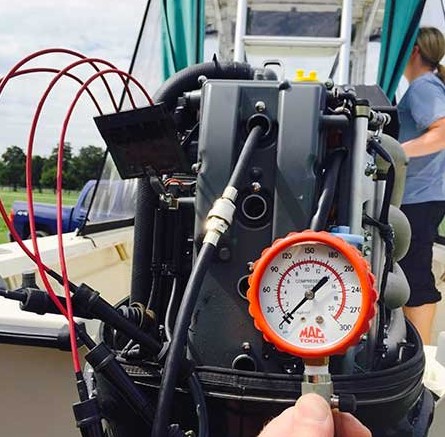
We also recommend a separate engine survey when buying a used boat, performed by a qualified mechanic. The general surveyor will just look at the motors, but it's important to know the state of the exhaust manifolds, check the compression, and so forth. The engine surveyor should take fluid samples to be sent off for analysis; this can show wear happening inside the engine before its effects are obvious, and is well worth the minimal cost.